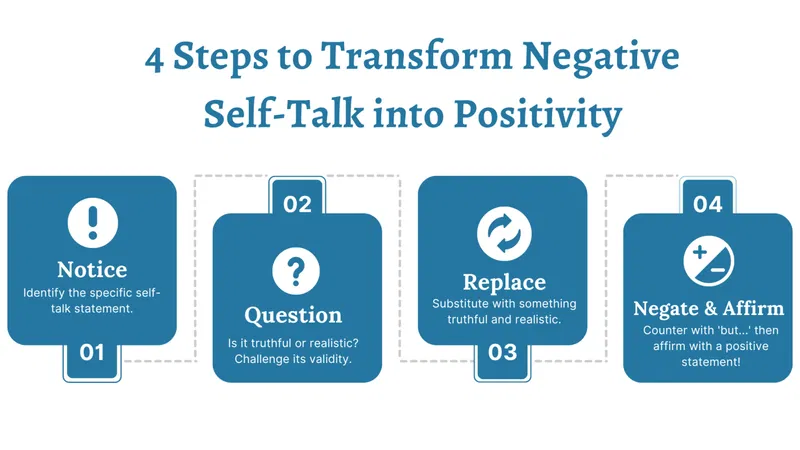Do you struggle with using harsh language toward yourself? Do you tend to see the glass in your life “half empty” rather than “half full”? Are you quick to be hard on yourself? If so, you may have an issue with negative self-talk.
Negative self-talk refers to the act of speaking to yourself in a harsh, mean, or unkind manner. Rather than being kind and supportive of yourself, you may lean into negative thinking patterns that harm you more than they help you.
Many people suffer from negative self-talk. If you struggle with negative self-talk, it is possible to change it into something more positive. Consider these six key steps to change those self-talk patterns into something more positive and productive.
Step 1: Identify your negative self-talk.
The first step toward changing negative self-talk is to identify it. When you know what the problem is, you can move forward with a solid plan of attack to challenge it and end it for good. Pay attention to your negative self-talk habits so you know what negative self-talk looks like for you.
Step 2: Identify any triggers that cause you to engage in negative self-talk.
Negative self-talk is usually triggered by a specific stimulus. When you experience
negative self-talk, pay attention to what was happening right before it began. Identifying these triggers can help you understand exactly what is causing you to engage in negative self-talk so you can stop it more easily.

Step 3: Identify any negative influences in your life that may be encouraging the negative self-talk.
Are you working in a toxic environment? Do you have any negative naysaying friends in your innermost circle? Do you tend to hang around people who don’t seem very happy or positive? If so, you may have some negative influences in your life. These negative influences can be directly related to your negative self-talk habits.
Step 4: Challenge your negative self-talk statements with something more positive.
Every time you notice a negative self-talk statement creeping in, challenge it. You can challenge negative self-talk statements by:
- Noticing the specific self-talk statement.
- Questioning its validity. Is it truthful or realistic? Probably not.
- Now, replace it with something that is more truthful and realistic. Remember, negative self-talk statements are often rooted in fear, uncertainty, or anxiety. This means whatever you’re saying is likely untrue or, at the very least, exaggerated.
- When you catch yourself saying something negative say BUT (which negates it) and then say something positive!

Examples:
“I’m not good at this task, BUT I can learn and improve with practice.”
“This project is too overwhelming, BUT I can break it down into smaller, manageable steps.”
“I made a mistake in my presentation, BUT I can use this as a learning experience to do better next time.”
Step 5: Practice using positive affirmations to shift into more positive thinking and self-talk habits.
Start using positive affirmations regularly throughout your day. This will help you get into the habit of adopting more positive self-talk habits. You can use all sorts of positive affirmations to motivate you in a variety of areas in your life. For example, consider these positive affirmations:
- “I am capable of achieving great things and I believe in my potential.”
- “I am worthy of love, respect, and success.”
- “Every challenge I face is an opportunity to grow and improve.”
- “I choose to let go of negativity and focus on the positive aspects of my life.”
- “I am resilient, strong, and able to overcome any obstacle.”
You can also craft your own unique set of positive affirmations; either way, they will help you accomplish the same task of getting accustomed to more positive self-talk.
Step 6: Reach out to people you can trust for extra support.
Any time you are trying to make big changes in your life, make an effort to surround yourself with people who support you. Tell people you trust, close friends and family members about your desire to disengage with the habit of negative self-talk; Ask for their support in your efforts to change.
Additionally, consider seeking support from a counselor or therapist. They can provide professional methods and guidance to help you permanently overcome negative self-talk habits.


